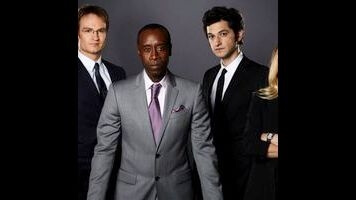Except it turns out that the episode is actually pretty good, though, in a twist both pleasant and frustrating. “Stochasticity” manages to improve House Of Lies both by removing some of the show's problems, and adding crucial strengths.
Ben Schwartz's character, Clyde, may have been the worst character on television last year. He was pointlessly slimy and charmlessly nasty, without either a redemption arc nor an acknowledgment of his villainy. He was just…there, being terrible, dragging everything down, but treated as an occasionally overenthusiastic puppy by his peers. “Stochasticity” doesn't directly change him, but it tones it down. A brief interaction with Jeannie where he acts nice in order to get information is at least slightly amusing, and him awkwardly trying to maintain a polyamorous relationship with two women was perhaps the most recognizably human he's ever been.
Second, Don Cheadle's Marty was, in the first season, treated as our guide to the world of House Of Lies. It was his narration and his artificial time-stopping constructions that dominated the structure of the show in a formal sense, while his emotions dominated the show in terms of narrative construction (how many episodes ended with him staring at the camera in vague terror while doing something self-destructive? Four?). Marty's still the main character, but the episode isn't filtered entirely through him. The only artificial construction we see is, when the pod is trying to get info from a client, the screen flashes “Blitz!” as they ask him increasingly demanding questions.
Instead, we see the episode through Jeannie's point of view. The mystery of what happened on the night she and Marty got wasted in the first season finale is her mystery, because she's the one asking the questions, and we see her flashbacks to the events of the night. This isn't inherently an improvement—Jeannie was less subtle in her terribleness, but still a terrible character. Still, moving House Of Lies away from being Don Cheadle's Vague Existential Terror and toward something more solid has potential, as does focusing on Jeannie and making her less stereotypical.
The positive addition to the show, at least in this episode, is thematic congruity. Every part of “Stochasticity” is build around the concept of identity. Jeannie shows up, declaring that she doesn't know who she is anymore. The pod has a client whose name is the only thing they know, so they have to figure out who he is. Clyde's relationship with two women seems to be going well, until Marty accidentally pushes them to define it, and who they are. Doug, well, Doug's identity is still annoying. And in perhaps the most telling scene, Marty goes to see his ex-wife, only to discover that she's apparently learned self-control and may not be a terrible person anymore. Who are you, can you change, and are you willing to change? are the questions raised in the episode, and I'm not going to say that it's brilliant and deep or anything, but the simple fact that there is a strong enough thematic element to pay attention to is worth noting.
I also downright enjoyed the narrative structure of the consultancy of the week. Having the pod struggle to figure out who the guy they're working with is, without letting him know that they're totally in the dark, seems to hit the right stakes and tone for what the business side of the show should be like. It's entertaining to see the pod struggle for a small victory that's their small victory, not a victory for forgettable guest stars, and it's also one that shows the ridiculous of the business.
Of course, all this could be fleeting. In a week, we could be back to Marty narrating, Clyde being irredeemable, and a frustratingly terrible consultancy of the week. But for now? Well, I'm an optimist (just look at any premiere review I do.) Perhaps House Of Lies will grow out of the “Most Disappointing” cocoon and into a beautiful “Pretty Good” butterfly.
Stray observations:
- “Are you serious? Is this model sound?” Good little character bit from Bell when told the odds that she'd slept with Marty.
- The bumblebee that came over to sing to Marty and Roscoe was a pleasant bit of weirdness that also served as a reminder that the show is set in L.A.. I was also dreading the inevitable jump cut to Marty fucking the singer. Thank goodness.
- Veganism is used as a symbol of self-control. I found this interesting.
- “Haven't said no yet!” “No yet!”
- FREE KRISTEN BELL
- So apparently Don Cheadle won a Golden Globe for his role in the first season, which, uh, yeah. First, hah. Second, for the love of god, stop treating these awards as anything other than a famous person party. Especially on Twitter. I'm begging you.






















![Rob Reiner's son booked for murder amid homicide investigation [Updated]](https://img.pastemagazine.com/wp-content/avuploads/2025/12/15131025/MixCollage-15-Dec-2025-01-10-PM-9121.jpg)


















